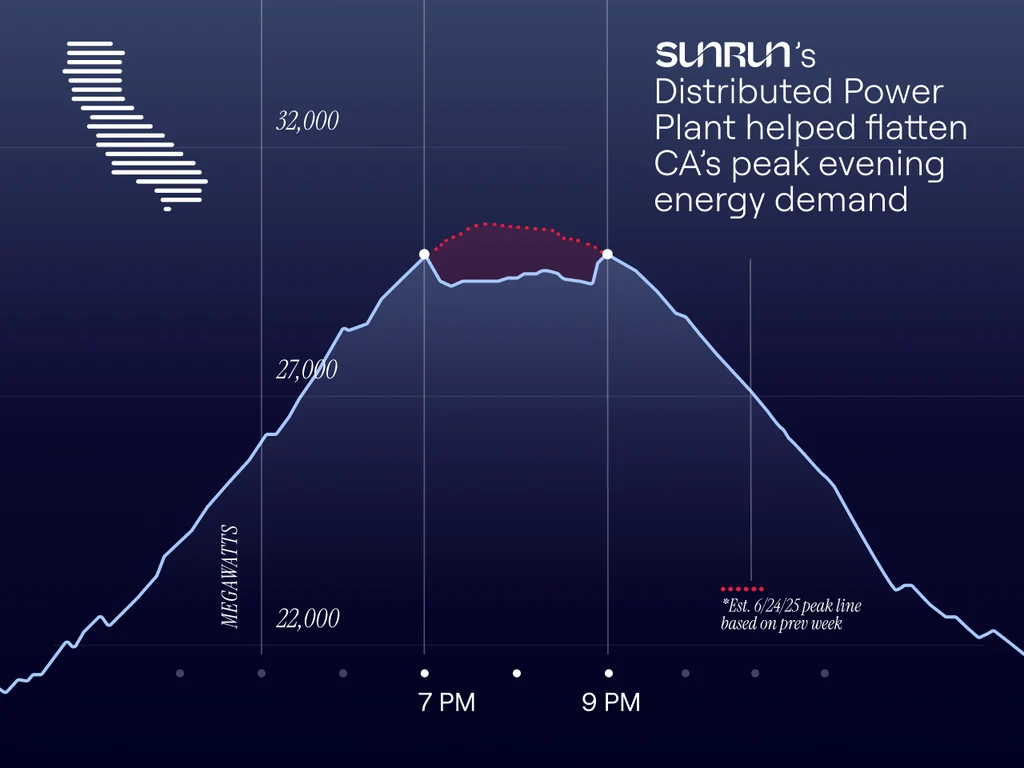

the challenge
Meeting the need for clean, dispatchable power

our solution
Meet peak demand quickly and avoid soaring capacity prices
What they are saying
Benefits
Your power needs met, now.
Utility-scale capacity
Proven ability to deliver large-scale capacity on-demand to improve grid reliability and meet your power needs, plus reduce peak consumption in real time.
Rapid, targeted deployment
DPPs are up and running within months instead of years, bypassing long build times and interconnection queues.
Targeted, local relief
DPPs deliver localized relief on feeders, distribution lines, and substations under stress.
Grid services compliance
Meet RTO and state DPP or demand response program goals.

Why Sunrun?
End-to-end solution
The Sunrun difference

Guaranteed clean dispatch

Advanced technology stack

Superior customer experience
Case studies
Deliver capacity and reliability today
Let's partner to build a smarter, more resilient grid for tomorrow, today.
Press
FAQs
What is the difference between a VPP and a DPP?
Distributed Power Plants (DPP) is Sunrun’s next-generation platform that goes beyond the limits of a Virtual Power Plant (VPP). While a VPP often relies on behind-the-meter resources like demand response, thermostats, or managed EV charging—essentially turning energy use up or down—a DPP can actively dispatch and inject clean energy back to the grid.
This capability makes a DPP far more powerful and valuable. It not only delivers the traditional grid services of a VPP but also provides customer resiliency, bill savings, and true grid support. By leveraging solar + storage systems at scale, DPPs give utilities flexible, dispatchable capacity while keeping homeowners protected and engaged—making it the smarter, more scalable evolution of the VPP.
Does Sunrun handle all customer communications?
Yes. Sunrun manages the full customer experience through our operations team, serving as the trusted partner from enrollment through ongoing participation. This lets utilities focus on grid operations while we handle customer engagement and support.
What data sharing or integration capabilities does Sunrun offer?
Sunrun provides flexible data sharing and integrations, including aggregated performance data, enrollment details, and dispatch results. We ensure secure interfaces or custom integrations that align with utility platforms and compliance needs.
How is account management structured?
Each utility partner has a dedicated Program Manager as their single point of contact, overseeing implementation, reporting, and ongoing support for efficient, high-touch service.
How does a Sunrun DPP balance customer resiliency with grid support?
Sunrun’s DPP technology prioritizes homeowner needs while supporting the grid. Features like Storm Watch and adjustable battery reserves maintain backup power during outages while dispatches are co-optimized for grid value.
Can a Sunrun DPP be dispatched outside typical system peak times?
Yes. Our DPP platform is highly flexible and can meet unique dispatch needs—whether outside peak hours, for special load profiles, or event-triggered responses.
Can Sunrun work with our third-party grid program administrator?
Yes. We regularly integrate with DERMS and third-party administrators, enabling seamless enrollment, data sharing, and coordinated dispatch within existing frameworks.